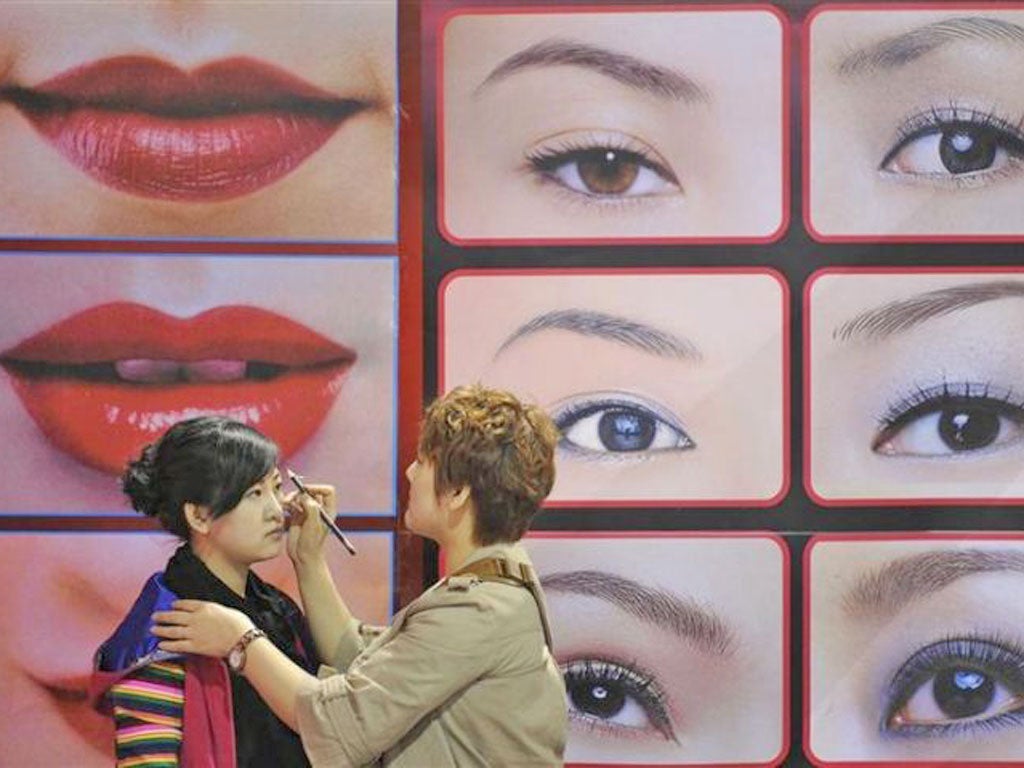Beauty companies return to animal testing to exploit Chinese demand
L'Occitane among firms told to remove 'Leaping Bunny' logo signifying ethical testing practices

Your support helps us to tell the story
From reproductive rights to climate change to Big Tech, The Independent is on the ground when the story is developing. Whether it's investigating the financials of Elon Musk's pro-Trump PAC or producing our latest documentary, 'The A Word', which shines a light on the American women fighting for reproductive rights, we know how important it is to parse out the facts from the messaging.
At such a critical moment in US history, we need reporters on the ground. Your donation allows us to keep sending journalists to speak to both sides of the story.
The Independent is trusted by Americans across the entire political spectrum. And unlike many other quality news outlets, we choose not to lock Americans out of our reporting and analysis with paywalls. We believe quality journalism should be available to everyone, paid for by those who can afford it.
Your support makes all the difference.Efforts by Western beauty giants to sell their brands to China's fast-growing middle classes are threatening to reverse years of progress in reducing animal testing, say campaigners.
Many UK shoppers think the battle against animal testing for lipsticks and blushers is won, but over the past year four multi-nationals have been stripped of official "cruelty-free" status because of their activities in China where animal experiments are mandatory.
France's L'Occitane, which has more than 70 boutiques in the UK selling Provencal beauty and bath products, has been ordered to remove the internationally recognised Leaping Bunny logo from its marketing worldwide, including in the UK. Fellow French firms Yves Rocher and Caudalie and America's Mary Kay have also been banned from using the logo. The companies say they want enjoyment of their shampoos, skincare and make-up to be spread among the 700 million women in China, where sales of cosmetics grew by 18 per cent to £10bn last year.
Campaigners accuse them of putting profits above principle. The Humane Society International is this week condemning the businesses in a campaign featuring the comedian Ricky Gervais, who will ask consumers to sign the charity's pledge to help end "cosmetics cruelty". Gervais, a noted anti-vivisection campaigner, told The Independent: "Like me, most people will be shocked to learn that testing cosmetics on animals is still a legal requirement in China. It makes me really angry that this is still going on, and it makes me particularly angry that some previously cruelty-free companies are abandoning their principles and returning to animal testing in order to profit from the Chinese market."
Britain banned animal testing for cosmetic purposes in 1998, and Body Shop, Lush and Superdrug guarantee their products and ingredients are "cruelty-free". A ban on the marketing of animal-tested cosmetics is due to come into force across the EU next year.
China maintains that animal testing is necessary to ensure mascara, blusher, foundation and other products are safe for humans.
L'Occitane, Yves Rocher and Mary Kay declined to comment on their policies or their withdrawal from the Leaping Bunny programme, which is overseen internationally by the Coalition for Consumer Information on Cosmetics. Mathilde Thomas, founder of Caudalie, who did respond, said: "We are now selling our products in China and Chinese government reserves the right to conduct tests with cosmetic products but I have hope this situation will change soon by outside pressure." She strenuously denied Caudalie was selling out. "I took the decision to sell my products in China in order to respond to Chinese women's demand who have been asking to use our products for many years," she said.
Troy Seidle, director of research and toxicology at HSI, said: "Cosmetic companies often claim they don't want to test on animals and only do so 'when absolutely necessary'. But it isn't absolutely necessary to sell their products in China, so if they truly had an ethical ethos they would stop animal testing and stick to operating in countries that don't require rabbits, guinea pigs and mice to endure pain for their profits."
Join our commenting forum
Join thought-provoking conversations, follow other Independent readers and see their replies
Comments